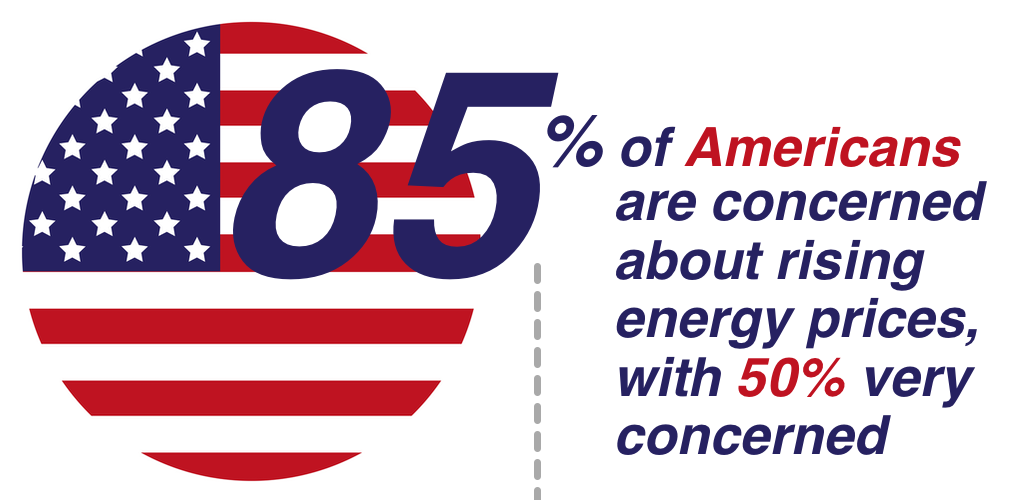
Soaring Energy Prices are Threatening to Wreck Recovery
Americans are alarmed over the rising cost of energy. According to new polling from Morning Consult, 85% of Americans are concerned about rising energy prices, with 50% very concerned. This concern cuts across party lines, with 85% of Democrats concerned and 89% of Republicans.
This soaring concern comes as the U.S. Energy Information Administration (EIA) warns consumers will be paying significantly more to heat their homes this winter. Those heating with propane and oil are likely to see their costs rise 54% and 43% respectively. For the half of Americans that heat with natural gas, their bills are likely to be up 30% and jump 50% if it’s a colder than average winter. From heating bills to rising electricity prices and pain at the gas pump, consumers are acutely aware of rising energy costs and policymakers should be too.
There’s no debate that the global energy crisis and its inflationary pressure have arrived in the U.S. Inflation is here and energy is the driver. According to the Bureau of Labor Statistics’ Consumer Price Index, the cost of food is up 4.6% over the past 12 months with the cost of all other goods, less food and energy, up 4%. The cost of energy, however, is up a staggering 24.8% in the same period.
Soaring energy prices are exactly what the economy and American workers simply can’t afford as the nation attempts recovery. Yet, energy-induced inflation is likely to get worse before it gets better. Unfortunately, that pain will fall hardest on those who can least afford it – it’s already happening in Europe.
As energy prices skyrocket in Britain and the European Union, policymakers are struggling to keep energy poverty from exploding. European Union Labor Commissioner Nicolas Schmit recently warned of a sharp rise in energy poverty this winter, telling a German news outlet that there are already millions of Europeans unable to afford to sufficiently heat their homes and this number could jump.
With per capita energy use higher in the U.S., even modest rises in energy prices can slam households with bills they can’t afford to pay. According to EIA analysis, nearly a third of American homes struggle to meet energy needs, with 7 million American households reporting that have experienced times where they have been unable to use heating equipment because of financial constraints. These challenges are particularly sharp for elderly and minority households – households that will struggle to stay afloat as bills spike this winter.
Value of Fuel Diversity
While heating costs and prices at the gas pump have jumped, the increase in electricity prices has been relatively modest. Although not immune to rising fuel costs, the U.S. power sector still maintains enough dispatchable fuel diversity to provide market optionality – for now. As natural gas prices have spiked, utilities have turned to the coal fleet to take pressure off consumers. The EIA expects coal generation to rise 22% year over year as coal takes market share from gas and serves as a price shock absorber, shielding ratepayers from higher-priced gas.
States and regions with little or no coal capacity to call on, such as New England, are likely to face far higher prices this winter and even fuel security and reliability challenges as fuel availability grows tight. Finding liquified natural gas cargoes to meet peak demand will be exorbitantly expensive if not impossible.
The lack of fuel diversity in New England mirrors the challenges now facing Europe. A rushed pivot away from coal and overreliance on natural gas as a bridge fuel is proving to be a costly mistake. The Economist recently observed, in Europe, “fuel switching was an option in the past, but that is difficult now.” Green activism has stymied nuclear power, much of Europe’s coal capacity has been closed and, “recent painful episodes of low wind and depleted hydroelectric reserves across parts of Europe have made clear, renewable energy is not yet a reliable substitute….” Out of options, Europe is left begging Vladimir Putin for help.
“Management by Chaos”
As one analyst recently told CNBC, Europe’s attempt to wean itself from fossil fuels has been “management by chaos,” and that high energy prices – driven by natural gas – could persist until 2025. Natural gas spikes are “not a short-term phenomenon.”
That should raise eyebrows in the U.S. Ever-increasing U.S. natural gas exports are exposing U.S. consumers to global market pressure. There’s no question that we’re not doing enough to preserve dispatchable fuel diversity; in fact, we’re doing the opposite. Policies designed to incentivize the premature closure of well-operating coal plants before capacity is in place to fill the gaps are endangering the energy transition by sacrificing energy affordability and the reliability of our grid.
In a Senate Energy and Natural Resources hearing this week, Federal Energy Regulatory Commission nominee Willie Phillips preached a “balanced approach” to the energy transition, explaining that reliability must come first. He likened the grid to a three-legged stool that requires all legs – reliability, affordability and sustainability – to maintain balance and stand. “If you have world class sustainability, but… sacrifice reliability, the chair will fall. Similarly, good sustainability and reliability without affordability means no one can sit in the chair,” he said.
American consumers need reliability and they must have affordability – a chair they can afford to sit in. As policymakers grapple with the energy crisis and look for lessons learned, it’s clear that the need for caution – the need for a thoughtful, responsible approach – in the energy transition is critically important. Chaos and policy-induced energy poverty can’t be the path forward.
- On October 20, 2021
